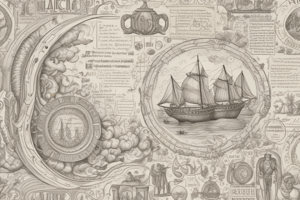Podcast
Questions and Answers
How does Dale's cone of experiences illustrate the importance of teaching aids in education?
How does Dale's cone of experiences illustrate the importance of teaching aids in education?
Dale's cone of experiences emphasizes that learners retain more information through direct experiences than through abstract concepts, highlighting the necessity of teaching aids that provide varied sensory experiences.
What are the criteria for selecting children's materials according to their qualities?
What are the criteria for selecting children's materials according to their qualities?
Children's materials should be age-appropriate, engaging, safe, and support developmental objectives while encouraging creativity and exploration.
Identify and explain one merit and one demerit of using visual aids in teaching.
Identify and explain one merit and one demerit of using visual aids in teaching.
A merit of visual aids is that they can enhance comprehension and retention of information, while a demerit is that they may oversimplify complex concepts.
Explain the ASSURE model's significance in the production of teaching materials.
Explain the ASSURE model's significance in the production of teaching materials.
What is one technique for material production that supports creative expression among students?
What is one technique for material production that supports creative expression among students?
Discuss the role of design principles in creating effective teaching aids.
Discuss the role of design principles in creating effective teaching aids.
Flashcards are hidden until you start studying
Study Notes
Importance of Teaching Aids
- Teaching aids enhance the learning process, making it more interactive and effective.
- Learning materials designed for children should be engaging, age-appropriate, and foster curiosity.
- Selection criteria for children's materials include educational value, durability, and accessibility.
Psychological & Philosophical Basis for Material Production
- Dale's Cone of Experience illustrates the effectiveness of learning through direct experience over abstract concepts.
- Bruner's modes of thinking emphasize three learning processes: enactive (hands-on), iconic (visual), and symbolic (abstract).
- The ASSURE Model outlines a framework for integrating media and technology into lessons for improved learning outcomes.
- Understanding these frameworks promotes the creation of materials that resonate with diverse learning styles.
Types of Teaching and Learning Materials
- Visual aids include charts, diagrams, and images, enhancing comprehension and retention of information.
- Audio aids involve recordings and music, stimulating auditory learning and engagement.
- Audio-visual aids combine visual and auditory elements, creating a richer learning experience.
- Each type of material has merits, such as increased engagement, and demerits, including potential distractions or resource limitations.
Techniques for Material Production
- Puppetry and masks provide an interactive and imaginative approach to storytelling and role-play.
- Drawing techniques like posters or picture cards facilitate visual learning and idea representation.
- Painting and craft techniques like basketry can enhance fine motor skills and creativity.
- Digital tools like PowerPoint allow for professional presentations that can incorporate various media.
- Collage, mosaic, and modeling encourage artistic expression and comprehension of topics in a tangible way.
Material Production & Demonstrations
- Creating educational materials through various techniques emphasizes practical skills in teaching.
- Demonstrating how to use created materials effectively reinforces learning objectives and shows applicability.
Principles of Design
- Principles of design include balance, contrast, emphasis, movement, pattern, rhythm, and unity, which contribute to effective material presentation.
- Elements of design, such as line, shape, color, texture, and space, are foundational when creating visually appealing educational tools.
Knowledge Empowers Progress
- Understanding the importance of teaching aids and effective design principles ultimately leads to better educational outcomes and empowers both educators and learners.
Studying That Suits You
Use AI to generate personalized quizzes and flashcards to suit your learning preferences.




